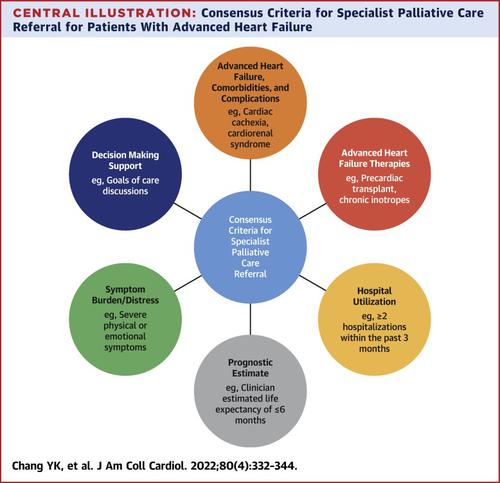Journal of the American College of Cardiology ( IF 21.7 ) Pub Date : 2022-07-18 , DOI: 10.1016/j.jacc.2022.04.057 Yuchieh Kathryn Chang, Larry A. Allen, John A. McClung, Martin A. Denvir, Jennifer Philip, Masanori Mori, Pedro Perez-Cruz, Shao-Yi Cheng, Anna Collins, David Hui

|
Background
Patients with advanced heart failure have substantial supportive care needs. Specialist palliative care can be beneficial, but it is unclear who is most appropriate for referral and when patients should be referred.
Objectives
We conducted a Delphi study of international experts to identify consensus referral criteria for specialist palliative care for patients with advanced heart failure.
Methods
Clinicians from 5 continents with expertise in the integration of cardiology and palliative care were asked to rate 34 disease-based, 24 needs-based, and 9 time-based criteria over 3 rounds. Consensus was defined a priori as ≥70% agreement. A criterion was coded as major if the experts endorsed that meeting that criterion alone was adequate to justify a referral.
Results
The response rate was 44 of 46 (96%), 41 of 46 (89%), and 43 of 46 (93%) in the first, second, and third rounds, respectively. Panelists reached consensus on 25 major criteria for specialist palliative care referral. The 25 major criteria were categorized under 6 topics, including “advanced/refractory heart failure, comorbidities, and complications” (eg, cardiac cachexia, cardiorenal syndrome) (n = 8), “advanced heart failure therapies” (eg, chronic inotropes, precardiac transplant) (n = 4), “hospital utilization” (eg, emergency room visits, hospitalization) (n = 2), “prognostic estimate” (n = 1), “symptom burden/distress” (eg, severe physical/emotional/spiritual distress) (n = 6), and “decision making/social support” (eg, goals-of-care discussions) (n = 4). The majority (68%) of major criteria had ≥90% agreement.
Conclusions
International experts reached consensus on a large number of criteria for referral to specialist palliative care. With further validation, these criteria may be useful for standardizing palliative care access in the inpatient and/or outpatient settings.
中文翻译:

晚期心力衰竭患者转诊接受专门姑息治疗的标准
背景
晚期心力衰竭患者有大量支持性护理需求。专科姑息治疗可能是有益的,但尚不清楚谁最适合转诊以及何时应转诊患者。
目标
我们对国际专家进行了一项德尔菲研究,以确定晚期心力衰竭患者的专家姑息治疗的共识转诊标准。
方法
来自五大洲在心脏病学和姑息治疗整合方面具有专业知识的临床医生被要求在 3 轮中对 34 项基于疾病、24 项基于需求和 9 项基于时间的标准进行评级。共识被先验定义为≥70%的一致性。如果专家认可仅满足该标准就足以证明推荐是合理的,则该标准被编码为主要标准。
结果
第一轮、第二轮和第三轮的答复率分别为 46 人中的 44 人(96%)、46 人中的 41 人(89%)和 46 人中的 43 人(93%)。小组成员就专科姑息治疗转诊的 25 项主要标准达成共识。25 项主要标准分为 6 个主题,包括“晚期/难治性心力衰竭、合并症和并发症”(例如,心脏恶病质、心肾综合征)(n = 8)、“晚期心力衰竭治疗”(例如,慢性正性肌力药物、心脏移植前)(n = 4)、“医院利用率”(例如,急诊室就诊、住院)(n = 2)、“预后估计”(n = 1)、“症状负担/痛苦”(例如,严重的身体/不适)情绪/精神困扰)(n = 6)和“决策/社会支持”(例如护理目标讨论)(n = 4)。大多数(68%)主要标准的一致性≥90%。
结论
国际专家就转诊至专科姑息治疗的大量标准达成了共识。经过进一步验证,这些标准可能有助于标准化住院和/或门诊环境中的姑息治疗。











































 京公网安备 11010802027423号
京公网安备 11010802027423号